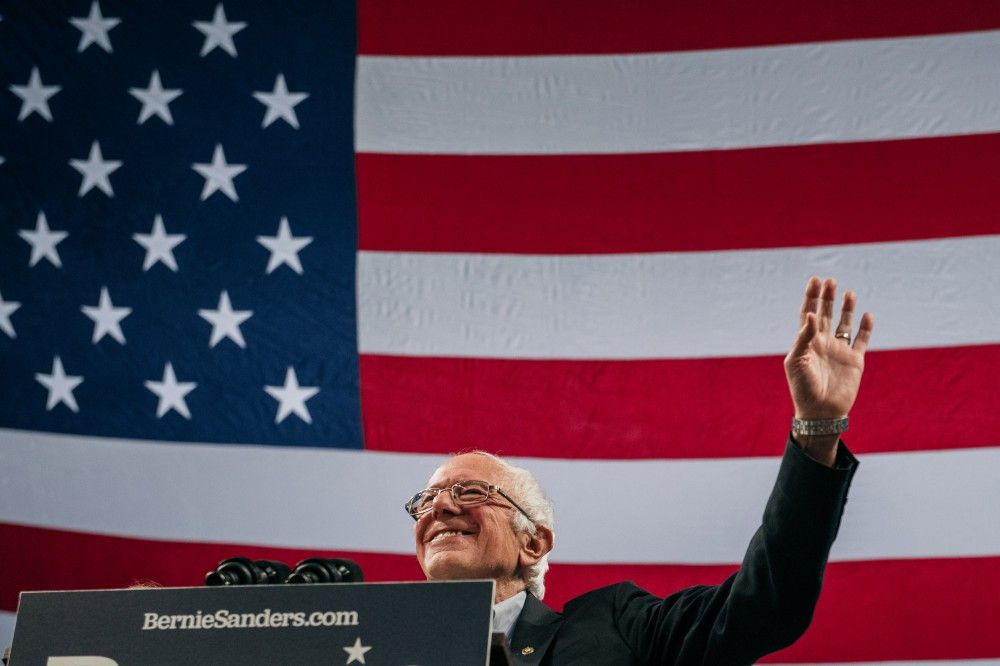
Bernie Sanders Leads Trump, All 2020 Candidates in Donations From Active-Duty Troops
No other 2020 candidate for president, including , can come close to matching ’ level of support among members of the U.S. military, to go by the most recent campaign finance data from the Federal Election Commission.
Soldiers, sailors, airmen, and Marines have donated a total of $185,625 to Sen. Sanders’ 2020 campaign. By comparison, they have given $113,012 to Trump, $80,250 to Pete Buttigieg, $64,604 to Sen. Elizabeth Warren, and a relatively paltry $33,045 to former Vice President Joe Biden, according to Doug Weber, a senior researcher at the Center for Responsive Politics.
For every candidate in the 2020 race, the CRP maintains a list of the 20 companies or institutions whose employees have given the most money to his or her campaign. Remarkably, the U.S. Army, the U.S. Navy, the U.S. Air Force, the Department of Defense, and the Department of Veterans Affairs all separately appear on Sanders’ list, comprising 5 of his top 20. The largest service branch, the U.S. Army, comes in at number 11, with $65,395 in total donations. That’s just behind Walmart, whose employees gave $69,523.
Sanders’ support from employees of Walmart, Amazon, Microsoft, and the U.S. Postal Service has been reported, but the strength of his appeal to the armed forces has gone largely unnoticed.
If Sanders wins the nomination and his financial support from service members translates into votes, it would represent a significant shift from 2016, when active-duty personnel were twice as likely to choose Trump over Hillary Clinton. In 2016, the Military Times sent a confidential survey to its 59,000 subscribers in the armed forces. The respondents preferred Trump to Hillary Clinton by a “huge margin,” and were nearly three times more likely to identify as Republican than Democrat.
But Trump’s support appears to have waned, leaving an opening for a Democrat this time around. In October 2018, a follow-up poll found that Trump’s popularity among active-duty personnel had faded noticeably, with half of respondents saying they were “unhappy” with the president. The FEC data suggest that Trump’s standing has deteriorated even further in the past two years, given that the troops are now donating much more to the peacenik senator from Vermont.
Though only a proxy measure, it could be a significant bellwether. The military employs 1.4 million people, which is not an immense bloc of voters in a nation of 330 million, but they represent a vast cross-section of America, from Alaska to Hawaii to Maine. The military is hugely diverse and officially apolitical. The officer corps leans conservative, but enlisted personnel are four or five times more numerous and harder to classify. Most enlisted recruits come from Sunbelt states like Florida and South Carolina, or deindustrialized Midwestern states like Ohio and Pennsylvania, to name a few feeder states that are important to the election. That not one or two but all three major branches of the armed forces, plus the Pentagon and V.A., all appear on Sanders’ top-20 list is probative, to say the least, of his ability to convert former Trump supporters in geographic regions that Democratic Party elites are fixated on turning blue in 2020.
The same can’t be said for the other Democratic contenders. Most of the people who have donated to former Vice President Biden’s campaign work at a law firm or a bank. Ten of the 20 employers on Sen. Warren’s list are elite universities. Buttigieg, a former naval intelligence officer, has received more from State Department employees than any other contender, and is the preferred candidate of those employed by agencies classified only as “U.S. Government.”
The simplest explanation for the flow of military donations to Sanders would be his unstinting opposition to disastrous foreign wars that have killed nearly 7,000 troops and left tens of thousands more maimed, burned, or psychologically scarred — to speak only of the domestic costs. Two-thirds of Iraq and Afghanistan veterans now say that the wars were not worth fighting, according to the Pew Research Center. Yet there are still thousands of soldiers and marines deployed to both countries. American casualties in Afghanistan are at their highest level in five years. The U.S.-backed government is now killing more civilians than the Taliban.
Trump’s initial appeal to the troops was likely down to the isolationist platform he ran on in 2016, but over the past three years, the president has shown that he lacks the leadership ability to overcome the inertia of the bipartisan war machine. Trump has only succeeded in reducing the American headcount in northern Syria — the one place where the U.S. military was actually achieving its stated mission, the defeat of the Islamic State. The rank betrayal of our Kurdish allies was as poorly timed as it was faithless, and must have sent waves of disgruntlement through the Army and Marine Corps. By now, military voters have probably figured out that Trump’s anti-war streak is fickle and phony. He has not ended the war in Afghanistan. He has made things worse in Iraq, stirring up the militias and provoking conflict with Iran. Nobody in the military wants war with that country; it would be a bloodbath. After dishonoring the United States in Syria, Trump sent more troops to protect his cronies in Saudi Arabia. He’s in some kind of weird cahoots with the ruler of Turkey, no friend of the USA. He continues to back Mohammed bin Salman’s shameful war in Yemen, over the objections of Congress.
Sanders has consistently excoriated Trump for all of this — and tried to thwart him in the Senate, especially on Yemen. When other Democratic candidates criticize Trump’s violent overseas directives, they tend to do so in a way that is hedged or equivocal. After Trump had Iranian Gen. Qassem Soleimani killed — a reckless international crime that proximately caused the downing of a civilian airliner — several Democratic contenders chided the president for his poor timing and failing to consult with Congress, but they mostly talked about what an evil guy Suleimani was and how much American blood he allegedly had on his hands. Sanders, by contrast, was unequivocal in describing the drone strike as an assassination — an illegal practice under United States and international law. “I was right about Vietnam,” he tweeted on January 3rd. “I was right about Iraq. I will do everything in my power to prevent a war with Iran. I apologize to no one.”
Another way to explain Sanders’s popularity is that service members who already receive the sort of health and educational benefits that he wants to make universal are less repelled by the democratic-socialism label than other Republican-leaning voters. They understand that being able to go to the doctor or attend college for free is not quite the same thing as living under a dictatorship of the proletariat. Personally, I don’t know what I would do without the V.A. The facility that I go to in Texas is convenient and free, and the recently constructed building is beautiful. Making the same benefits available to all Americans would have been a much better use of the generational fortune we squandered in Iraq. That attitude is not uncommon among the rank-and-file.
It’s possible that once the general election begins, more troops will open their wallets for Trump, but Sanders’ current advantage must be an ominous sign for the president’s campaign advisers. Trump’s greatest strength, aside from the purity of his narcissism, is his ability to smell weakness. As yet, he doesn’t seem to have an edge on “Crazy Bernie,” the inadvertently flattering nickname Trump gave to a rival he clearly sees as a rising threat. The Trump campaign has only recently begun to field-test anti-Sanders talking points, and so far they mostly have to do with national security. “Bernie Sanders can’t be trusted to defend American lives,” said a recent statement distributed by the Trump campaign. The president hit the same note at a Ohio rally in early January, telling his fans that Sanders was weak on terrorism, weak on Iran, dangerously naive, and so on.
It’s a stale and uninspired line of attack, not sharp or transgressive in the way that Trump has gone after rivals in the past. If the number of uniformed personnel currently giving money to Sanders is any indication, simply calling him soft on terrorism or Iran will fall flat, in the military and at large. That’s played-out neoconservative talk, the very thing that Trump once rebelled against.
The CRP will have the latest FEC data the first of February, and the Trump team ought to be worried. It’s not only his claim to being the “trade guy” that Trump stands to lose should Sanders become the nominee — it’s his claim to being the real anti-war candidate in the race.



